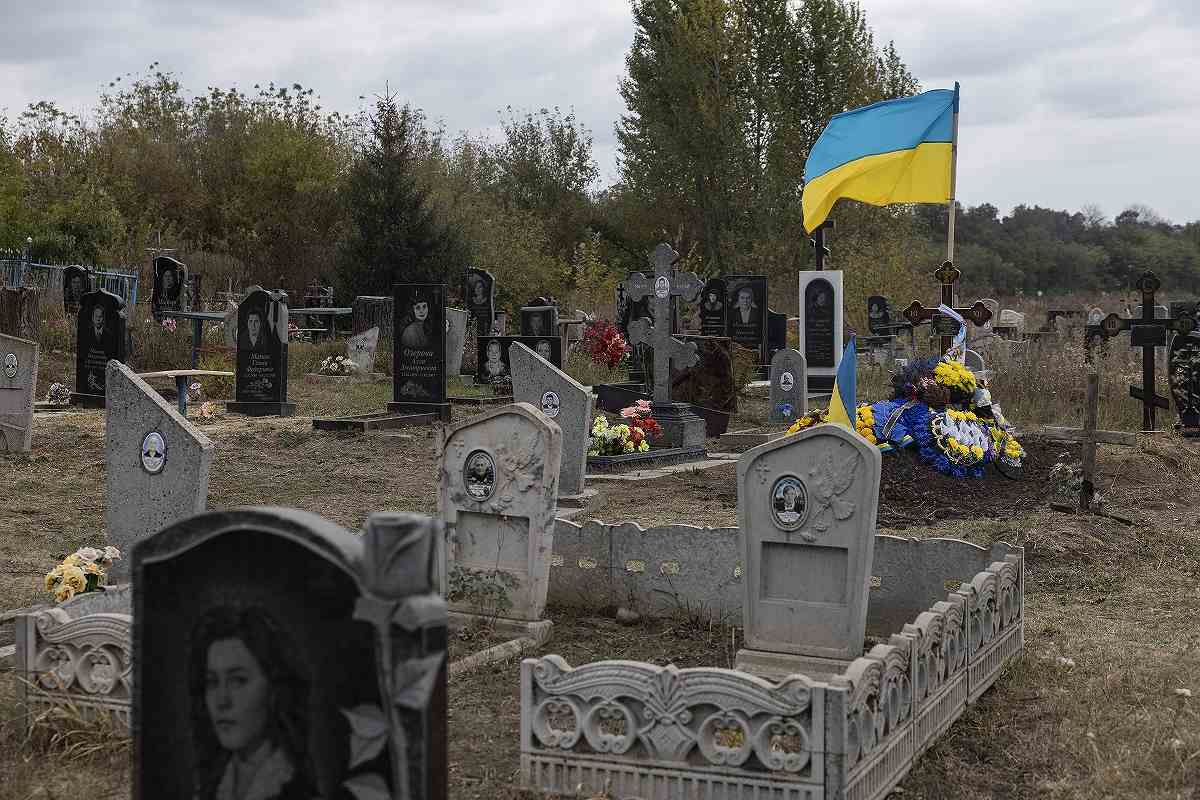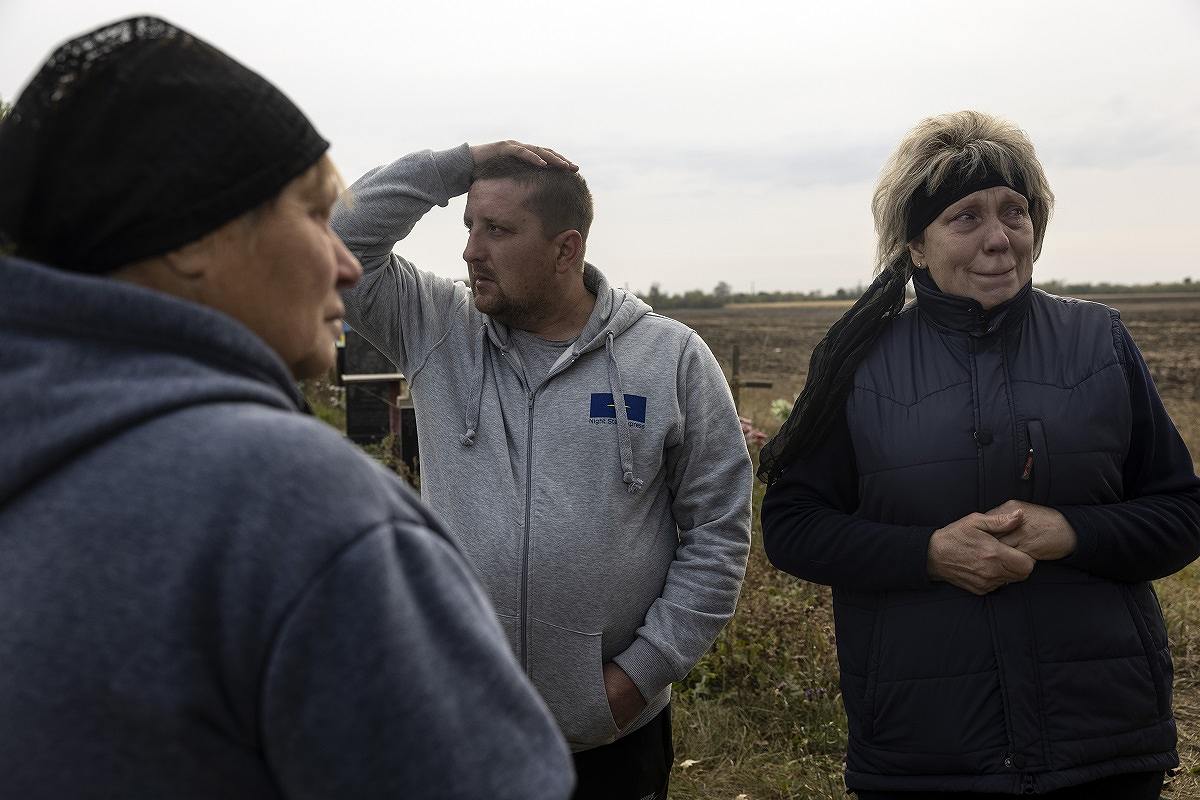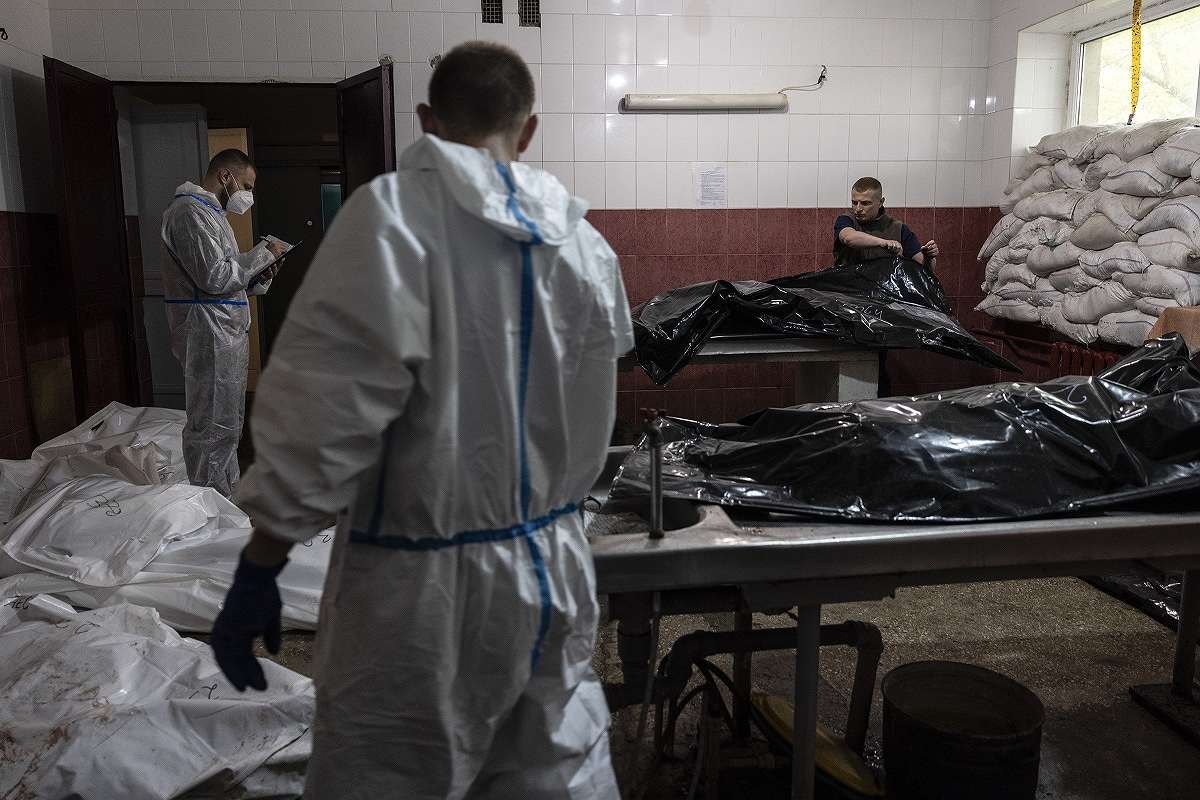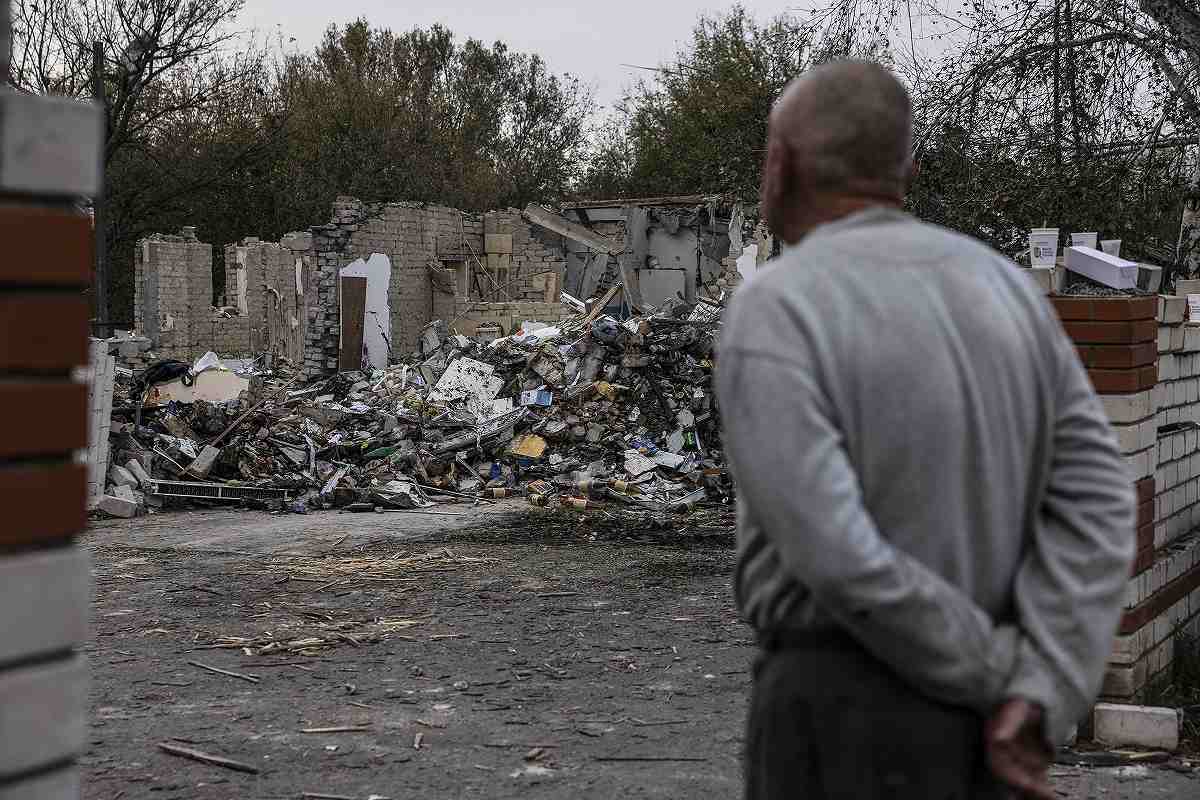
A Russian missile strike in the Ukrainian village of Hroza on Thursday killed so many people that the cemetery cannot fit all the dead and needs to be expanded.
14:11 JST, October 7, 2023
HROZA, Ukraine – So many people were killed in a Russian missile strike here Thursday that workers with excavators have begun clearing trees and bushes to expand the size of the cemetery.
At least 52 people have been declared dead, and as body identification got underway Friday, it became apparent that the vast majority of them were civilians, making the hit on Hroza one of the deadliest civilian strikes of the war.
Residents had been attending a funeral reception for a local soldier, Andriy Kozyr, when the missile hit, reducing the cafe and grocery store where they had gathered into a pile of rubble and killing about a sixth of the village population.
If the attack is found to have intentionally targeted the funeral with the knowledge that most attendees were civilians, it could be categorized as a war crime.
Ukrainian President Volodymyr Zelensky described it as a “fully deliberate terrorist attack.”
In the village on Friday, survivors expressed overwhelming grief, confusion and suspicion as they tried to make sense of why a place with no strategic value in the war had suffered such destruction.
Locals said Kozyr’s widow and other relatives were among the dead. At least one child was killed, and two others were missing Friday.
The bodies, which volunteers and rescue workers had dragged out of the rubble, were all transferred to the regional capital of Kharkiv for identification, which may require DNA testing in cases of severe injuries.
Morgue workers said that they had seen no evidence of multiple military personnel among the dead and that most victims appeared to be older. Washington Post reporters observing the morgue examinations saw only one of the dead wearing a military uniform.
Many villagers said they suspect a Russian sympathizer living among them informed the Russian military about a planned gathering for a fallen soldier.
Hroza is no more than a tiny stretch of land some 20 miles from the front-line city of Kupyansk. After Russia launched its full-scale invasion in February 2022, the village was held under Russian occupation until Ukrainian troops liberated it in a surprise counteroffensive last fall. But locals said some living there remain loyal to Moscow.
“This is not a coincidence,” said Serhiy Pletinka, 34, a Ukrainian soldier home on leave from the southern front. His parents live across from the cafe, and when the strike occurred, he rushed outside to help. He said many of the bodies were beyond recognition. One, his former teacher and his friend’s father, was identified only by the blue jeans he always wore, he said. Another was a soldier he knew had gone on leave to attend the funeral.

Lyuba Savchenko, left, and Inessa Troshena at the cemetery in Hroza. They lost their sister Halya Chykala and four cousins on Thursday.
Lyuba Savchenko, 63, and Inessa Troshena, 58, lost their sister Halya Chykala, 62, and four cousins in Thursday’s strike. The pair were among the weeping families surveying the cemetery in Hroza on Friday morning, some using sticks and tape to cordon off where they hope to bury their dead relatives, leaving notes to reserve the space. The cracking sound of two more incoming artillery attacks landing nearby filled the air.
“What else could it be?” Savchenko replied when asked if she, too, believed that a local collaborator had informed Russian forces about the funeral reception, prompting the strike.
The immensity of the civilian toll contradicts Russian President Vladimir Putin and other Moscow officials who claim Russian forces only attack military targets.
On Friday morning, Russia launched a separate strike on Kharkiv, killing a 10-year-old boy and wounding dozens of others.
The morgue reflected the horrors of the massacre in Hroza. Blood streaked the floors as dozens of workers dressed in white gowns and medical gloves sifted through piles of bodies and parts of bodies that had been severed by the powerful blast.

Morgue workers sift through bodies in Kharkiv.
Workers held up a foot stuck to a shoe to try to match it to a man in gray jeans. Others tried to match a female hand to another victim.
There were so many body bags that they had to be laid out in the hallway, some stacked for lack of space. One piece of a limb sat in a cardboard box on the front steps.
By afternoon, the staff announced they had found the intact body of a boy, believed to be a 6-year-old named Ivan. Oksana Oliinyk, deputy head of the Kharkiv police’s investigative department, said some small body parts that may have belonged to children were recovered at the scene, but their origins were still unknown.
In one room, mangled flesh sat on a metal table awaiting inspection. At the next table over, a morgue worker narrated his examination of a headless torso and legs while his colleagues recorded notes in the corner.
The workers were careful to mark down full descriptions – small details like the French manicure they saw on one victim or the gold tooth on another could help provide closure for relatives who may not otherwise be able to identify their loved ones.
Back in Hroza, stunned civilians returned to the scene of the attack.

Yurii Chykala, 62, at the scene of Thursday’s missile attack in Hroza that killed at least 52 people, including his wife.
Yurii Chykala, widow of Halya, whose sisters had been looking for a burial spot, said he, too, believed a local betrayed them. “It was a very precise shot,” he said, “so someone here did it. I don’t know who.”
He said he had found his wife Thursday, dead but still warm, lying outside, burned with a shrapnel wound to her head. “There’s no point in living anymore,” he said.
He didn’t sleep all night and planned to do nothing but drink for the next three days, he said.
“There’s an emptiness in my soul. Just emptiness,” he added. “Yesterday, I was painting the house, she was helping me hold my brush. … My wife had put the buckwheat on the table to cook it later. I see it, it’s there. But she isn’t.”
Across the street, Lyuba Pletinka, 61, whose son Serhiy assisted in the rescue efforts, said that most of the village had learned about the funeral plans by word of mouth last month and that she is “100 percent sure someone passed on that information” to the Russians. Sitting on the bench outside her simple white-and-green house, she said she suspects some 50 percent of the village may harbor pro-Russian sentiments.
Just then, a man in a black jacket walked by, hardly glancing at the strike site. Pletinka went quiet and then nodded her head in his direction to indicate she believed he was among them. During occupation, she said, Russian forces held her and her husband at gunpoint to force them to share their crops with the occupying soldiers. That man, she said, shared with them willingly and also reported their son – then a civilian – as a former soldier who had fought in the country’s east in 2014. Serhiy was then captured as a Russian prisoner of war, she said, but was eventually released and rejoined the Ukrainian military.
Her neighbor, Pavlo Miller, 72, stopped by to check on her. He was sleeping when the strike hit and went outside only to find chaos. Like many others, he said he believed a Russian collaborator called in the strike. “We kind of even know who,” he said.
Their other neighbor, Valentina Koyizenko, 73, who lost several close friends in the strike, said she also believed “someone spilled information” to the Russians.
“The minute everyone sat down, a rocket struck?” she said. “It’s not a coincidence.”
She started to cry. “It’s so scary,” she said. “How many friends of mine have I lost? Oh, God. Oh, God.”
At the cemetery down the road, Oleksiy Androsovych, 60, gathered with relatives to measure out a plot for his brother and sister-in-law killed the day before.
Their son and his nephew, Dmytro, warned him that the funeral could take days to prepare, as his parents’ bodies might require DNA testing for formal identification. “They could be mutilated,” Dmytro warned.
“I know,” Oleksiy replied. “I was there, I saw it. They were lying next to each other.”
“Do you want one grave or two?” he asked. “Let’s do two,” Dmytro replied.
Then the family took out a measuring tape and marked off a plot of three meters by three meters, taping it off to indicate to others that the spot was taken. They got there early enough to find space next to other deceased family members.
Their relatives would be buried just two rows behind their friend Andriy Kozyr – the soldier whose funeral they died to attend.
Top Articles in News Services
-

Survey Shows False Election Info Perceived as True
-

Hong Kong Ex-Publisher Jimmy Lai’s Sentence Raises International Outcry as China Defends It
-

Japan’s Nikkei Stock Average Touches 58,000 as Yen, Jgbs Rally on Election Fallout (UPDATE 1)
-

Japan’s Nikkei Stock Average Falls as US-Iran Tensions Unsettle Investors (UPDATE 1)
-

Trump Names Former Federal Reserve Governor Warsh as the Next Fed Chair, Replacing Powell
JN ACCESS RANKING
-

Producer Behind Pop Group XG Arrested for Cocaine Possession
-

Japan PM Takaichi’s Cabinet Resigns en Masse
-

Man Infected with Measles Reportedly Dined at Restaurant in Tokyo Station
-

Israeli Ambassador to Japan Speaks about Japan’s Role in the Reconstruction of Gaza
-

Videos Plagiarized, Reposted with False Subtitles Claiming ‘Ryukyu Belongs to China’; Anti-China False Information Also Posted in Japan






















